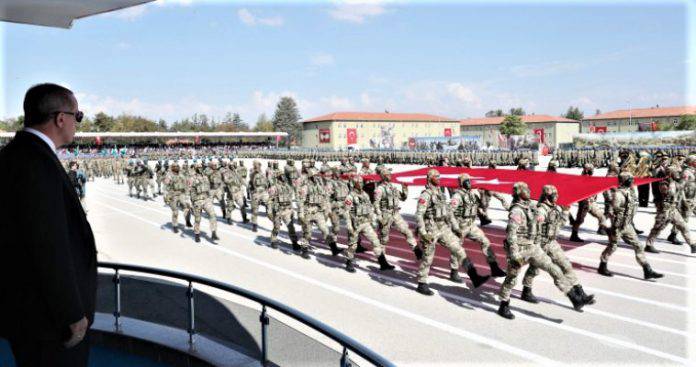Vasilis Fouskas: Why Erdogan’s Turkey will remain a strong player
06/11/2020
The Turkish state has a diverse strategy, managing a complex web of conflicting international interests while at the same time also managing, through this successful handling, the risks it takes, especially with commitments on the battlefield, to upgrade its geostrategic position and stance towards Greece and Cyprus.
This strategy is explicitly imperialist because today’s Turkey, an important international link in the structure, assembly, production, and consumption of globalization, is exporting both capital and power. The successful management of globalized interests takes on political-military forms.
We have seen this in the examples of Syria and Libya, where despite the strained relations between Turkey and Russia, a functional modus vivendi between the two countries remains. We have seen it in the case of Nagorno-Karabakh, where while all bets are open, Turkey is not afraid, because it is, above all, a member of NATO, and the US wants to have the oil of Baku and the pipelines away from Russian influence, so Turkey is protected as a counterweight to Russia.
Russia will not wage war with Turkey on Armenia, no matter how much Turkey incites the continuation of the war in the region. What Russia wants is to end the war quickly and impose a solution in favor of Azerbaijan so that Turkey does not benefit too much. The US, in other words, continues (despite what Turkey did to it with the S-400 and other issues, in order to “punish” the US for the coup against Erdogan in 2016) to see Turkey as the key balancer of Russian power, from Bosnia to Central Asia, Syria, the Eastern Mediterranean, and North Africa.
The more Erdogan’s neo-Ottoman discourse wins consensus and loyalists and recruits jihadist mercenaries, the more accountable it becomes to the US, because the US and the West, in general, know that these fanatical forces are practically committed to military operations and to acting both against Russian expansion and against – and this should not come as a surprise – any anti-American future plans against France, Germany, and even China. Turkish influence also touches upon the western Chinese province of Xinjiang, home to 40 million Uighur Turkic-speaking people.
Imperialist player
Turkey, in other words, is a regional imperialist player of many dimensions and speeds, a possibility seen by Turgut Ozal in the 1980s, but this neo-Ottoman perspective, for a number of reasons – one of them is the most recent US economic downturn and its tacit withdrawal from regional conflicts following the defeats in Iraq / Afghanistan – matured and came to power under the neo-Islamic Erdogan regime. After all, a fundamental precondition for the success of this perspective was the clearing of accounts on the domestic front first, something that Erdogan achieved.
In this context, it should be emphasized that the geostrategic value of Greece, as estimated by the US and NATO, remains inferior to that of Turkey – as it also was during the Cold War – and no change is going to occur in US foreign policy. on this issue with the new President.
A more recent development that strengthens Turkey’s position in the Balkans and the Eastern Mediterranean vis-a-vis Russia – but also Greek interests – is Erdogan’s new defense agreement with Ukrainian President Volodymyr Zelensky, an agreement that encompasses trade and technology for the benefit of both countries. It should be noted that 250,000 Tatars live in Crimea, and they are culturally and linguistically identical to the Turks.
I consider this agreement to be Turkey’s most important gift to the United States, as it enables NATO to block Russian power in the Black Sea, cutting it off from vital development sites in the Mediterranean and elsewhere. We see that Turkey is willing, in a smart way, to work for the United States in the theaters of Syria, Libya, the Caucasus, and the Black Sea, without undermining its national interests. On the contrary, it manages to strengthen them more and more through a multidimensional imperialist policy, which does not hesitate to commit itself on the battlefields by taking casualties.
Erdogan’s hypocrisy
This is something the West can no longer do, and in a sense France has “lost” Libya: while leading the bombing against the Gaddafi regime, neither it nor Italy had committed military operations on land to put in order the anarchy that followed. Erdogan, however, took advantage of the opening presented to him and hurried to fill the gap.
If this is the case, then what are the immediate duties of a democratic Greece? I would say that these, in part, stem from the above analysis of the nature of Turkish expansionism and the necessities that arise within Turkey itself, at a time of declining US influence in world politics and economics.
Erdogan accurately outlined a hegemonic neo-Ottoman narrative that moves Muslims throughout the former Ottoman Empire and beyond, often accusing the West of racism and imperialism, which is generally true but at the same time completely subtle. . This for two main reasons:
- The first is that Erdogan – like Kemal Ataturk in 1920 when he approached Lenin’s Bolsheviks – has nothing to do with socialism and the working class, since the economic policy he pursued in Turkey was and is extremely neo-liberal, accompanied by a strong dose of authoritarianism, austerity, and drastic restriction of civil liberties, largely consolidated a form of state of emergency, especially after the failed coup against Erdogan in 2016.
- The second reason is more obvious: Erdogan’s leadership is highly racist – on an anti-Christian basis – and, of course, imperialist. Some of the interdependent tasks of democratic Greece come from here.
The immediate duties of Greece
The first immediate task of a democratic Greece is to establish strong and unshakable relations of mutual support with the democratic people and factions of Turkey with the aim of overthrowing the Erdogan regime and promoting the Kurdish movement and the working class as basic popular buttresses for the country. This policy must be extended to Western societies as a whole.
The second immediate task is the exercise of the unilateral right of Greece to extend the territorial waters in the Aegean at 12nm. This is an inalienable right of the country under international law and should be characterized as the first just blow to Turkish imperialism. This step must be accompanied by a huge popular mobilization, centering the Greek people as the collective Constitutional patriot and underlying-implementer of national-popular rights.
The third immediate task stems from the country’s ambiguous and submissive position in the Eurozone and NATO. Here, a democratic Greek government must move, with the support of the people, towards dialectical detachment from economic subjugation and the regime of constant austerity imposed by the memoranda. The country will never be able to resist Turkish imperialism unless this crucial issue is resolved.
Any “Greek” decisions on any key national and class issue will be constructed by the Western imperialist powers which, as we have seen, consider Turkey more geostrategically important than Greece: thus, these decisions will primarily serve the interests of Turkey and of the West, and then, if there is “space”, the interests of the Greek people. This is the deep meaning of Erdoganism for a “diplomatic solution” in the Eastern Mediterranean.
The fourth task, equally important, is directly related to the immediate overthrow of the new fait accompli in Famagusta and the launch of a solution to the Cyprus problem on the basis of an independent, bi-communal, democratic, and non-aligned Republic of Cyprus without NATO troops, especially Turkey’s occupation army, and without Ana-style racist bi-zonal designs. Greece and Cyprus will be respected and appreciated in the West and East only when Cyprus acquires non-aligned democratic characteristics as a truly sovereign state, honoring the inspired political line of Archbishop Makarios and the sacrifices of the Cypriot people.





